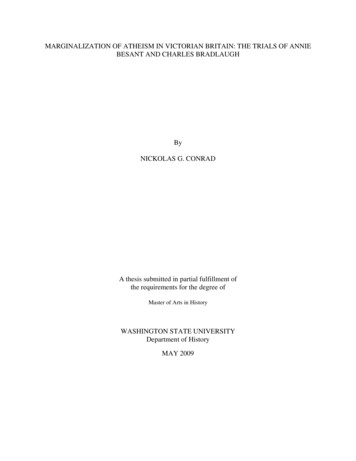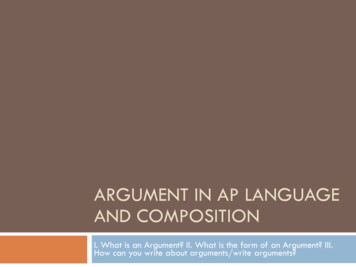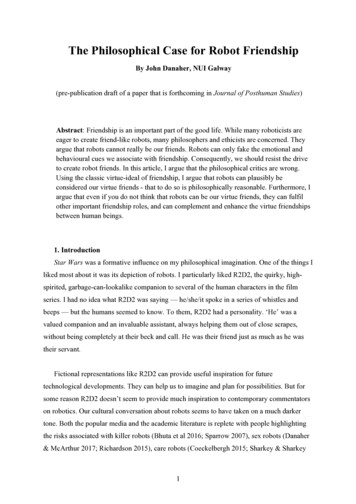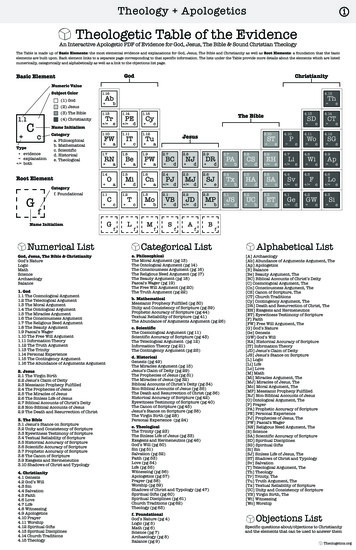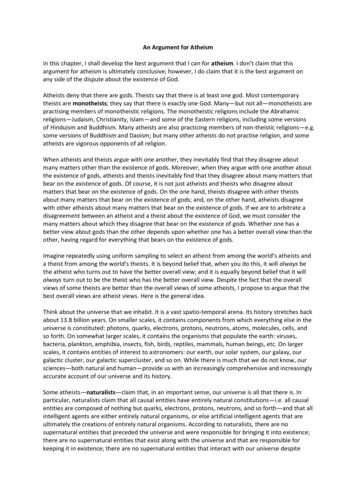
Transcription
An Argument for AtheismIn this chapter, I shall develop the best argument that I can for atheism. I don’t claim that thisargument for atheism is ultimately conclusive; however, I do claim that it is the best argument onany side of the dispute about the existence of God.Atheists deny that there are gods. Theists say that there is at least one god. Most contemporarytheists are monotheists; they say that there is exactly one God. Many—but not all—monotheists arepractising members of monotheistic religions. The monotheistic religions include the Abrahamicreligions—Judaism, Christianity, Islam—and some of the Eastern religions, including some versionsof Hinduism and Buddhism. Many atheists are also practicing members of non-theistic religions—e.g.some versions of Buddhism and Daoism; but many other atheists do not practise religion, and someatheists are vigorous opponents of all religion.When atheists and theists argue with one another, they inevitably find that they disagree aboutmany matters other than the existence of gods. Moreover, when they argue with one another aboutthe existence of gods, atheists and theists inevitably find that they disagree about many matters thatbear on the existence of gods. Of course, it is not just atheists and theists who disagree aboutmatters that bear on the existence of gods. On the one hand, theists disagree with other theistsabout many matters that bear on the existence of gods; and, on the other hand, atheists disagreewith other atheists about many matters that bear on the existence of gods. If we are to arbitrate adisagreement between an atheist and a theist about the existence of God, we must consider themany matters about which they disagree that bear on the existence of gods. Whether one has abetter view about gods than the other depends upon whether one has a better overall view than theother, having regard for everything that bears on the existence of gods.Imagine repeatedly using uniform sampling to select an atheist from among the world’s atheists anda theist from among the world’s theists. It is beyond belief that, when you do this, it will always bethe atheist who turns out to have the better overall view; and it is equally beyond belief that it willalways turn out to be the theist who has the better overall view. Despite the fact that the overallviews of some theists are better than the overall views of some atheists, I propose to argue that thebest overall views are atheist views. Here is the general idea.Think about the universe that we inhabit. It is a vast spatio-temporal arena. Its history stretches backabout 13.8 billion years. On smaller scales, it contains components from which everything else in theuniverse is constituted: photons, quarks, electrons, protons, neutrons, atoms, molecules, cells, andso forth. On somewhat larger scales, it contains the organisms that populate the earth: viruses,bacteria, plankton, amphibia, insects, fish, birds, reptiles, mammals, human beings, etc. On largerscales, it contains entities of interest to astronomers: our earth, our solar system, our galaxy, ourgalactic cluster, our galactic supercluster, and so on. While there is much that we do not know, oursciences—both natural and human—provide us with an increasingly comprehensive and increasinglyaccurate account of our universe and its history.Some atheists—naturalists—claim that, in an important sense, our universe is all that there is. Inparticular, naturalists claim that all causal entities have entirely natural constitutions—i.e. all causalentities are composed of nothing but quarks, electrons, protons, neutrons, and so forth—and that allintelligent agents are either entirely natural organisms, or else artificial intelligent agents that areultimately the creations of entirely natural organisms. According to naturalists, there are nosupernatural entities that preceded the universe and were responsible for bringing it into existence;there are no supernatural entities that exist along with the universe and that are responsible forkeeping it in existence; there are no supernatural entities that interact with our universe despite
inhabiting a domain that is somehow separated from our universe; and there are no intelligentagents apart from entirely natural organisms and agents that are ultimately the creations of thoseentirely natural organisms. Moreover, according to naturalists, there are none but natural causalforces and none but natural causal powers: there are no supernatural powers or supernatural forcesthat exert influence on our universe.Theists differ in the ways that they depart from naturalism. Some theists believe in a God whocreated our universe ex nihilo. Some theists believe in a God whose actions preserve our universe inexistence. Some theists believe in a God who inhabits an eternal realm that has no spatiotemporalrelation to our universe. Some theists believe in an intelligent and active God who is neither anatural organism nor an artificial intelligence created by natural organisms. Some theists believe in aGod that is a non-personal supernatural power or supernatural force that exerts influence on ouruniverse. Some theists believe that the universe possesses the non-natural property of being divine,or that the non-natural property of being divine ‘permeates’ the universe. And so on.Although theists differ in the ways in which they depart from naturalism, there is a common featureto theistic departures from naturalism. In every case, theists differ from naturalists by believing insomething additional: either believing in one or more additional intelligent agents, or believing inone or more additional forces or powers, or believing in one or more additional non-naturalproperties of the universe.Suppose that we are comparing a particular version of theism with a particular version of naturalism.Suppose, further, that these versions of theism and naturalism agree in their beliefs about whichnatural entities, and natural powers, and natural forces, and natural properties, and natural lawsthere are. In this case, it’s not just that the theist has beliefs in something over and above the thingsthe atheist believes in; it’s also the case that the naturalist does not have beliefs in anything overand above the things the theist believes in. From the standpoint of the naturalist, the theistic beliefsof the theist are pure addition; and, from the standpoint of the theist, the naturalistic beliefs of thenaturalist are pure subtraction.In this case, if all else is no better than equal, then there is clear reason to prefer naturalism totheism. For, if all else is no better than equal, then there is no reason to have the additional theisticbeliefs. Hence, in this case, in order to decide between theism and naturalism, we just need todetermine whether all else is no better than equal.Could it be, for example, that, while theism is logically consistent, naturalism is contradictory? Surelynot! We can think of naturalism as the product of two claims: (1) a claim N which is an account ofthe natural universe; and (2) the claim that the natural universe is all that there is in the causaldomain. And we can think of theism as the product of three claims: (1) the same claim N to whichthe naturalist is committed; (2) a claim T which is an account of the theistic realm; and (3) the claimthat the natural realm and the theistic realm are all that there is in the causal domain. If N is notlogically consistent, then neither theism nor naturalism is logically consistent. But, if N is consistent,then it is hard to see how naturalism could be inconsistent. Furthermore, if N is consistent, it is verytempting to think that it is much more likely that theism is inconsistent than it is that naturalism isinconsistent. After all, it might be that T is inconsistent. And even if T is consistent, it might be thatthe conjunction of T and N is inconsistent.Suppose, then, that theism and naturalism are both logically consistent. How else might it turn outthat there is reason to have theistic beliefs? The obvious thought is surely that there is evidence thatfavours theism over naturalism. It might be, for example, that there are features of the naturaluniverse that have no explanation on naturalism, but that are well-explained on theism. Or it might
be that there are features of the natural universe that have an explanation on naturalism, but thathave a much better explanation on theism. If there are explanations given by theism that aresuperior to the corresponding explanations of naturalism, then, at the very least, we no longer havea straightforward argument for the superiority of naturalism over theism. However, if it turns outthat there are no features of the natural universe that have a better explanation on theism than theydo on naturalism, then, I think, we have very good reason to think that naturalism is superior totheism.The burden of the rest of this chapter is to argue that there are no features of the natural universethat have a better explanation on theism than they do on naturalism. Of course, I won’t be able toexamine every feature of the natural universe that might be thought to have a better explanation ontheism than it does on naturalism. However, I shall try to examine all of the most prominent featuresof the natural universe that have been widely supposed to have a better explanation on theism thanon naturalism. Given the treatment of the cases that I do discuss, it should be obvious how to extendthe discussion to features of the natural universe that I do not examine here.1. ExistenceSome theists might be tempted to argue as follows: Naturalists can give no explanation of theexistence of the universe; but theists can explain the existence of the universe in terms of thecreative activities of God. So, on this point, theism is ahead.To see what is wrong with this argument, compare the following argument for the claim that theearth rests on the back of a giant elephant. You who do not believe in the elephant have noexplanation of why the earth does not fall, given that it is hanging in empty space. I, on the otherhand, explain this by appeal to the elephant, which keeps the earth from falling. So, on the point ofthe earth’s not falling, we believers in the elephant are ahead of you who do not believe in theelephant.The obvious point to make about belief in the elephant is that the elephant hypothesis suffers fromexactly the same alleged deficit as the hypothesis of the unsupported earth. If the earth does requiresomething to stop it from falling, then the elephant will be equally in need of something to stop itfrom falling. So, clearly, the postulation of the elephant does not bring with it any explanatoryadvantage.A similar point applies to the explanation of the existence of the universe. Whatever range ofoptions is open to the theist to explain the existence of God, exactly the same range of options isopen to the naturalist to explain the existence of the universe. If it is open to the theist to say thatGod exists of necessity, then it is open to the naturalist to say that the universe exists of necessity. Ifit is open to the theist to say that God’s existence involves an infinite regress, then it is open to thenaturalist to say that the existence of the universe involves an infinite regress. If it is open to thetheist to say that the existence of God has no explanation, then it is open to the naturalist to say thatthe existence of the universe has no explanation. Insofar as we are interested in explaining theexistence of the universe, the postulation of a God who creates the universe does not bring with itany explanatory advantage.2. Causation
Some theists may be tempted to argue as follows: Naturalists can give no explanation of the causalrelations that hold in our universe; but theists can explain these causal relations as originating withGod.To see what is wrong with this argument, we need only think about the structure of global causalreality, i.e. about the structure of the sum of all causings. Since it is the best case for theist, let’ssuppose that global causal reality involves a first causing—i.e., a causal relation in which the cause isnot also an effect in a prior causal relation.If we are thinking about the original causings in causal reality, then, while the naturalist supposesthat the first causing is a transition from the initial, uncaused state of the universe, the theistsupposes that the first causing is a transition from the initial, uncaused state of God. Since, as we’vealready seen, theists and naturalists have exactly the same range of options when it comes toexplaining the existence of the initial uncaused state, it is obvious that theists and naturalists haveexactly the same range of options when it comes to explaining the original causings in global causalreality. Insofar as we are interested in explaining causal origins, the postulation of a God who createsthe universe does not bring with it any explanatory advantage.If we are thinking about what powers causings in causal reality, then, where the naturalist supposesthat there is no further thing that powers transition of state of the universe, the theist supposes thatthere is no further thing that powers transition of state of the global reality that includes both Godand the universe. While, in this case, theist and naturalist may differ on the question whetherindependent causal power rests with global causal reality or with a part of global causal reality, it isclear that postulating God as the locus of independent causal power does not confer anyexplanatory advantage on theism over naturalism.3. Fine-TuningSome theists may be tempted to argue as follows: Naturalists can give no explanation of the finetuning of our universe, whereas theists can explain the fine-tuning as originating with God. (Theclaim that our universe is fine-tuned for life just is the claim that, if any of several fundamentalphysical constants had taken a very slightly different value, life would not have emerged in ouruniverse. For the purposes of the present discussion, I shall simply assume that our universe is finetuned for life.)To see what is wrong with this argument, we should ask ourselves where it might be that the finetuning first makes its appearance in global causal reality. There are really just two possibilities.On the one hand, it might be that there is a non-initial point in global causal reality at which the finetuning appears. Before this point, the fine-tuning of our universe is not set in stone; but, after thispoint, the fine-tuning of our universe is fixed. If that’s how it goes, then it is clearly a matter ofchance that our universe is fine-tuned: any transition from ‘not set in stone’ to ‘set in stone’ must bea matter of chance. But, in that case, the fine-tuning of our universe is ultimately a matter of chance.Hence, in that case, there is no explanatory advantage that accrues to theism.On the other hand, it might be that there is an initial state of global causal reality in which the finetuning of our universe is already fixed. On the naturalist view, that initial state is the initial state ofthe universe; on the theist view, that initial state is the initial state of God, which includes God’sdetailed intentions for the creation of our universe. In this case, it is clear that naturalism and theismhave the same range of options when it comes to explaining the fine-tuning of our universe. On eachview, it might be said that the initial state is necessary, in which case the fine-tuning turns out to be
necessary. On each view, it might be said that the initial state is contingent, and that there are otherpossible initial states that do not lead to our fine-tuned universe; and, in that case, the fine-tuning ofour universe turns out to be brutely contingent. However it plays, there is no explanatory advantagethat accrues to theism.4. MoralitySome theists may be tempted to argue as follows: Naturalists can give no explanation of theinstantiation of objective moral values in our universe, whereas theists can explain the instantiationof objective moral values in our universe as originating with God. (Many people—theists andnaturalists alike—agree that it is morally wrong to torture human infants just for fun. And its beingmorally wrong to torture human infants just for fun is all that it takes for there to be at least oneobjective moral value.)To see what is wrong with this argument, we should ask ourselves what we can say about theinstantiation of objective moral values in global causal reality. In our discussion, we set aside thethought that there are no objective moral values instantiated in global causal reality, since this isclearly a case that does not favour theism over naturalism.In global causal reality, it may be that some things instantiate objective moral values derivatively, i.e.,merely because other things instantiate objective moral values. Since an infinite regress of derivativeinstantiations of objective moral values would clearly not favour theism over naturalism, we can setthis case aside. That leaves us with the case that there are non-derivative instantiations of objectivemoral value in global causal reality. But it is clear that naturalism and theism are on a par when itcomes to explaining non-derivative instantiations of objective moral value in global causal reality.If there are non-derivative instantiations of objective moral value in global causal reality, thenobjective moral value is theoretically primitive: non-derivative instantiations of objective moralvalues are not explained in terms of anything else. Typically, theists suppose that God is good, whereGod’s goodness is understood to be theoretically primitive: there isn’t anything else in virtue ofwhich God is good. Typically, both naturalists and theists suppose that pleasure is good, where thegoodness of pleasure is understood to be theoretically primitive: there isn’t anything else in virtue ofwhich pleasure is good. But, if objective moral value is theoretically primitive, then considerationsabout the fact that there is instantiation of objective moral value in our universe does not favourtheism over naturalism.5. ConsciousnessSome theists may be tempted to argue as follows: Naturalists can give no explanation of theinstantiation of consciousness in our universe, whereas theists can explain the instantiation ofconsciousness in our universe as originating with God. (Consciousness is instantiated in the universein the lives of all typical human beings, and in the lives of typical members of many other animalspecies. While, in typical members of this large range of animal species, there are periods in theirlives when they are not conscious—e.g. when they are deeply asleep—there are also periods in theirlives when they are conscious, aware of their surroundings, and so on.)To see what is wrong with this argument, we should ask ourselves what we can say about theinstantiation of consciousness in natural causal reality. In particular, we should ask ourselves whatwe can say about the connection between the instantiation of consciousness and the instantiation ofother natural properties in natural causal reality.
On any plausible view, there is a very tight connection between instantiations of consciousness inhuman beings and instantiations of neural properties in human beings. Opinion differs on the exactnature of this connection: some maintain that consciousness in human beings just is a neuralproperty of human beings, while others maintain that there is mere correlation betweenconsciousness in human beings and a neural property of human beings. If consciousness in humanbeings just is a neural property of human beings then there is no difference between theexplanations that naturalism and theism give of the connection between instantiations ofconsciousness in human beings and instantiations of neural properties in human beings. If, however,there is mere correlation between consciousness in human beings and a neural property of humanbeings, then, while naturalists will appeal to emergence to explain the connection betweeninstantiations of consciousness in human beings and instantiations of neural properties in humanbeings, theists will appeal to God’s creative intentions to explain the connection betweeninstantiations of consciousness in human beings and instantiations of neural properties in humanbeings. Here, it seems that naturalism and theism are on an explanatory par: each has anexplanation of the connection between instantiations of consciousness in human beings andinstantiations of neural properties in human beings that does nothing at all to illuminate the natureof the connection. But, if that’s right, considerations about the instantiation of consciousness in ouruniverse do not favour theism over naturalism.6. MiraclesSome theists may be tempted to argue as follows: Naturalists can give no explanation of variousmiracles that have occurred in the unfolding of history in our universe, whereas theists can explainthe occurrence of those miracles in terms of special divine action.To see what is wrong with this argument, we should ask ourselves how we propose to explain all ofthe reports of miracles that we find in the unfolding history of our universe. In particular, we need tomake sure that we pay attention to the full range of reports of interventions, episodes, activities andphenomena that are anomalous from the standpoint of currently well-established science.On any plausible view, it is uncontroversial that the overwhelming majority of reports ofinterventions, episodes, activities and phenomena that are anomalous from the standpoint ofcurrently well-established science should not be given any credence at all. As [David Hume] said inhis famous discussion of miracles, everyone can agree that almost all reports of interventions,episodes, activities and phenomena that are anomalous from the standpoint of currently wellestablished science are squarely in the domain of ‘knavery and folly’. While naturalists are able togive a uniform explanation of reports of miracles—attributing all of them to human knavery andfolly—theists who wish to mount an argument from miracles are required to claim that there are asmall number of reports of miracles that do not suffer from the crippling liabilities which attach to allof the other reports of interventions, episodes, activities and phenomena that are anomalous fromthe standpoint of currently well-established science.The fact that naturalists are able to give a uniform explanation of reports of miracles, whereastheists who wish to given an argument from miracles are required to give a highly non-uniformexplanation of reports of miracles, gives naturalists a significant advantage when it comes to theexplanation of reports of miracles. Given that theists agree with naturalists on the explanation of thevast majority of reports of miracles, but disagree amongst themselves on the identification of thereports of miracles on which naturalist explanations go wrong, there is every reason to suppose thattheists do not have a stronger position than naturalists when it comes to the explanation of reportsof miracles.
7. Religious ExperienceSome theists may be tempted to argue as follows. Naturalists can give no explanation of thereligious—mystical, spiritual, sacred—experiences of human beings: encounters with the divine,possession by the divine, and sensations of oneness with the divine. But theists can explain all ofthese religious experiences in terms of perceptions of God.To see what is wrong with this argument, we should ask ourselves how we propose to explain all ofthe reports of hard-to-interpret experiences that we find in the unfolding history of the universe. Inparticular, we should make sure that we pay close attention both to the reports that we all make ofhard-to-interpret experiences that we typically do not take to be perceptions of God—e.g. shiversdown the spine, variations in mood and affect, certain types of feelings of being watched, and soforth—and also the interpretations that naturalists give to their own ‘mystical’ experiences—e.g.intense sensations of looking at familiar things from new perspectives, feelings of being completelyat home in the universe, and so on.The most obvious thing to note in connection with reports of hard-to-interpret experiences is thesheer diversity of religious and non-religious interpretations that are attached to these experiences.In particular, it is worth noting that more or less every religious sect in the world takes its hard-tointerpret experiences to be confirmation of the truth of its teachings, even though the teachings ofthe religious sects of the world are in manifold contradiction with one another. Given this more orless universal inclination to take hard-to-interpret experiences to be confirmation of the truth ofteachings that are in manifold contradiction with competing teachings, it is clear that all of thereligious sects of the world give interpretations of their own hard-to-interpret experiences that arevery different from the interpretations that they give to the hard-to-interpret experiences of thosewho belong to other religious sects. But, when we set the conflicting interpretations to one side, itseems that the content of the conflicting hard-to-interpret experiences is universal: everyone hasmuch the same hard-to-interpret experiences.Given the similarities in the hard-to-interpret experiences across diverse cultures, there is clearreason to prefer unified explanations of these hard-to-interpret experiences to the non-unifiedexplanations provided by the different religious sects of the world. The obvious suggestion—adopted by many naturalists—is to seek unified explanations in terms of cognitive science andevolutionary theory. Perhaps, for example, the diversity of interpretations ultimately springs fromour universal disposition to suppose that we are in the presence of agents even when we are in factalone. Hypersensitivity to the presence of agents would very likely have been an evolutionarilysuccessful strategy: mistakenly supposing that hostile agents are present is much less costly thanmistakenly supposing that there are no hostile agents present. But it is easy to see how a tendencyto postulate agents when no agents are present could underwrite interpretations of the experiencesattendant upon misfiring detections in terms of the types of entities postulated by the religious sectsof the world. (Think about the uneasy feelings that you sometimes have when you hear noises whileyou are lying awake late at night. Surely that’s not someone trying to force open your door!)Perhaps the hypothesis of hypersensitive agency detection does not explain all of the data about theinterpretation of hard-to-interpret experiences. However, as things currently stand, there is noreason to suppose that theists have, or are ever going to have, better explanations of the data aboutreports of hard-to-interpret experiences than naturalists.8. Meaning and Purpose
Some theists may be tempted to argue as follows: Naturalism, unlike theism, entails that our liveshave no meaning and purpose. Naturalists, unlike theists, lead lives that have no meaning andpurpose and believe that their lives have no meaning and purpose. On naturalism, unlike on theism,there is no possibility of life after death, and there is no epic cosmic melodrama in which humanbeings figure as central characters.To see what is wrong with this argument, we need to ask where meaning and purpose plausibly arise,and we need to ask what connection the source of meaning and purpose has to life after death andthe context provided by epic cosmic melodrama.[Aristotle] taught that meaningful, purposeful, flourishing human lives are lived in flourishingcommunities by flourishing people who have genuine friendships, exercise both theoretical andpractical wisdom, and act with a range of moral and intellectual virtues in the pursuit of valuableindividual and collective ends, in the absence of certain kinds of liabilities, such as ill-health, financialhardship, bereavement, and the like. On the assumption that this account of meaningful andpurposeful lives is roughly right, it is clear that naturalists are no less capable than theists of livingmeaningful and purposeful lives. Moreover, it is also clear that neither life after death norparticipation in an epic cosmic melodrama is required for meaningful and purposeful lives: our livescan satisfy all of the requirements for meaning and purpose even if death is an absolute full stop,and even if the universe will eventually become a cold, empty void.Even if you think that Aristotle’s account of meaning and purpose is mistaken it its details—perhaps,for example, in what it says about liabilities that would destroy meaning—it is plausible to supposethat it is in the right ballpark overall. In particular, it is surely plausible to suppose that neither lifeafter death nor participation in an epic cosmic melodrama is the kind of thing that could make ahuman life meaningful and purposeful if that life did not otherwise have meaning and purpose. Ifyou can’t find meaning and purpose in love, family, friendship, and the pursuit of intrinsicallyvaluable projects, then, I think, there is no chance that you will find it anywhere else. But, if that’sright, then theism gains no advantage over naturalism with respect to considerations about meaningand purpose.9. ConclusionAs I mentioned at the outset, I cannot claim to have considered all of the data that bears on thedecision between theism and naturalism (and not can I claim to have given a fully adequateassessment of any of the data that I have considered). However, I hope that I have done enough toindicate how my argument for naturalism would look if it were set out in full and complete detail. (Igive a fuller
of Hinduism and Buddhism. Many atheists are also practicing members of non-theistic religions—e.g. some versions of Buddhism and Daoism; but many other atheists do not practise religion, and some atheists are vigorous opponents of all religion. When atheists and theists argue with one another, they inevitably find that they disagree about

